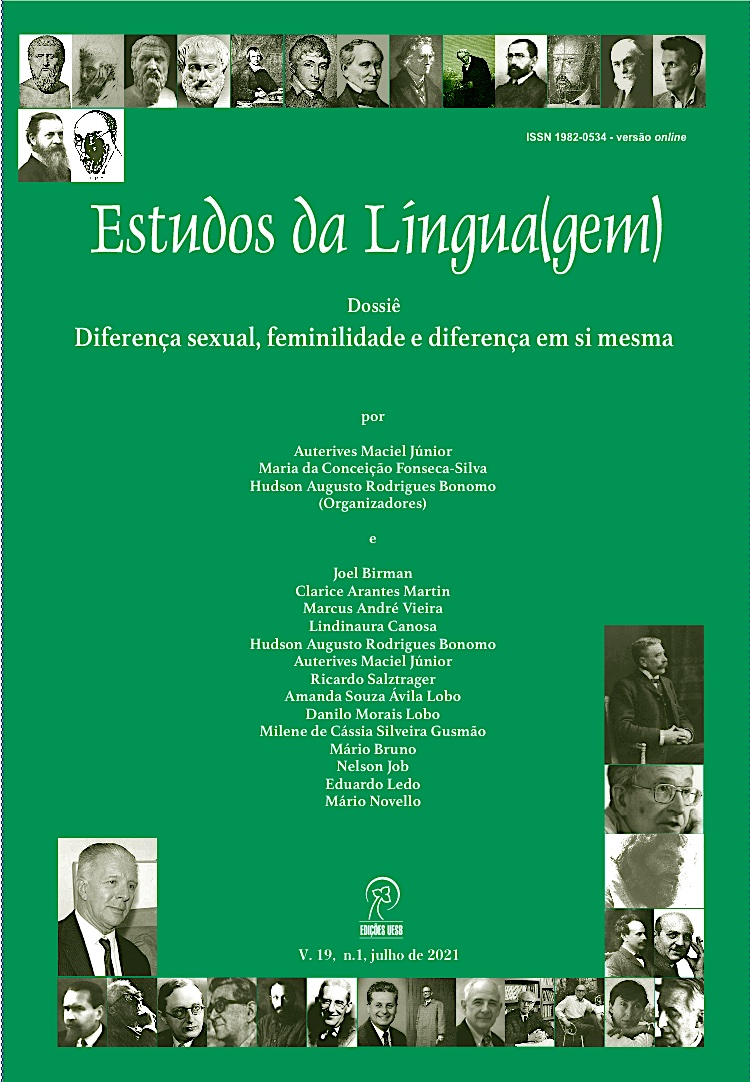Subversions of the genre: Butler, Preciado, Lacan
DOI:
https://doi.org/10.22481/el.v19i1.9135Keywords:
Genre; Performance; Dildo; Jouissance; Sexuation; Lacan.Abstract
This article aims to reflect on different theoretical strategies that fulfill the objective of destabilizing the understanding of gender as something fixed and stable, referred to a binary system. In addressing Lacan's sexuation theory and some aspects of queer theory, we seek to corroborate the idea that the tension between such fields is extremely fertile. Initially, we highlight Butler's notion of performance and Preciado's dildo theory: two different ways of thinking about gender as an open way of becoming. Finally, we add the Lacanian contribution to the debate. In our view, the emphasis of the sexuation theory is its reference to jouissance, as a singular experience of the sexual in the body, which consequently decentralizes the notion of being. As a result, the theory of sexuation moves away from the theme of gender as it aims to capture what goes beyond the limits of the attribution of social roles.
Downloads
References
BATAILLE, G. (1957) O erotismo. Tradução: Fernando Scheibe. Belo Horizonte: Autêntica Editora, 2013. – (FILÔ/Bataille).
BUTLER, J. Problemas de gênero, feminismo e subversão da identidade (1990) Ed, Civilização Brasileira, 2008.
BUTLER, J. Corpos que pesam: sobre limites discursivos do sexo. In: O corpo educado: pedagogias da sexualidade. LOURO, Guacira L. (org.). Belo Horizonte: Autêntica, 2000. p. 151-172. Edição original: 1993.
CAMARGO, F. Sujeito do desejo, sujeito do gozo e falasser. Opção lacaniana online, 2007. Disponível em: http://www.opcaolacaniana.com.br/antigos/pdf/artigos/lfesujei.pdf. Acesso em: 31/03/2021.
COLLING, L. ARRUDA, M. NONATO, M. Perfechatividades de gênero: a contribuição das fechativas e afeminadas à teoria de gênero. Caderno Pagu, n. 57, nov, 2019. Disponível em: https://www.scielo.br/scielo.php?script=sci_arttext&pid=S0104-83332019000300501&lng=en&nrm=iso&tlng=pt. Acesso em: 03/11/2019.
HARAWAY, D. Manifesto ciborgue. In: Antropologia do Ciborgue, as vertigens do pós humano. São Paulo: 2ed, Autênctica, 2009. Edição original: 1990.
LACAN, J. A significação do falo. In J. Lacan, Escritos. Rio de Janeiro: Jorge Zahar, 1998. Edição original: 1958.
LACAN, J. Mais, ainda. In : LACAN, J. O seminário (Vol. 20). Rio de Janeiro: Zahar, 2008. Edição original: 1972-1973.
LAQUEUR, T. A invenção do sexo: Corpo e gênero dos gregos a Freud. Rio de Janeiro: Relume-Dumará, 2001. Edição original: 1992.
MILLER, J-A. Os seis paradigmas do gozo. Opção Lacaniana Online, 7. São Paulo: EBP, 2012. Edição original: 1999. Disponível em: http://opcaolacaniana.com.br/pdf/numero_7/Os_seis_paradigmas_do_gozo.pdf. Acesso em: 03/04/2021.
PRECIADO, B. P. Manifesto contrassexual: práticas subversivas de identidade sexual (Maria Paula Gurgel Ribeiro, Trad.). São Paulo: Editora N-1, 2014. Edição original: 2004.
PRECIADO, B. P. Entrevista com Beatriz Preciado, por Jesús Carrilo. Revista Poiésis, n 15, p. 47-71, Jul de 2010. Disponível em: http://www.poiesis.uff.br/PDF/poiesis15/Poiesis_15_EntrevistaBeatriz.pdf. Acesso em: 28/03/2021.
PRECIADO, B. P. Eu sou o monstro que vos fala. Conferência congresso AMP: Mulheres em psicanálise, 2019. Disponível em: https://sarawagneryork.medium.com/eu-sou-o-monstro-que-vos-fala-94dd10a366ef. Acessado em: 10-fev-2021.
SAFATLE, V. Maneiras de transformar o mundo: Lacan, política e transformação. São Paulo. Editora Autêntica, 2020.
VIEIRA, M. Sobre o falocentrismo (ou Notas de psicanálise, sexo e política, primeira parte). AMPBlog. 2019. Disponível em: http://uqbarwapol.com/sobre-o-falocentrismo-ou-notas-de-psicanalise-sexo-e-politica-primeira-parte-marcus-andre-vieira-ebp/. Acesso em: 20/01/2021.
VIEIRA, M. (Falo, paranoia e bricolagem (ou Notas de psicanálise, sexo e política, segunda parte). AMPBlog., 2019. Disponível em: http://uqbarwapol.com/falo-paranoia-e-bricolagem-marcus-andre-vieira-ebp/. Acesso em: 20/01/2021.
Downloads
Published
Issue
Section
License
Copyright (c) 2021 Estudos da Língua(gem)

This work is licensed under a Creative Commons Attribution 4.0 International License.

Estudos da Língua(gem) is licensed under a Creative Commons Attribution 4.0 International License.
Authors who publish in the journal Estudos da Língua (gem) agree with the following terms:
The journal Estudos de Língua(gem) maintains the copyrights of the contributions published. These rights include the publication of the contribution and make its content available for free through the portal.













